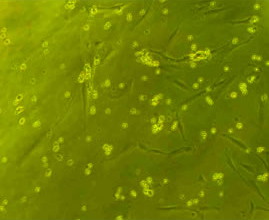

REGENERATIVE MEDICINE WITH
ADULT STEM CELLS AND EXOSOMES
Stem cells and their regenerative function, resemble in importance to the appearance of antibiotics during the first half of the twentieth century. Adult stem cells come from the patient's adipose tissue. Since they are autologous cells (the patient's own cells), they lack contraindications. They are obtained from adult tissues and there is no risk of rejection since they are extracted from the patient and placed in the same patient.
Under normal conditions, stem cells protect an organ when there is a cell injury, deterioration or destruction. When this deterioration and destruction is greater than the organism's regenerative capacity, a degenerative disease occurs.
In these cases, the organism is helped by using a larger number of stem cells.
It is important to note that autologous adult stem cells continuously form and replace cells that are dying within different organs. This means that they are part of the normal physiological process that the organism has in the continuity of life.
The procedure of autologous implant (in the same patient) of stem cells is made through a surgical procedure, fully approved worldwide. For this reason, it can only be carried out by a Plastic Surgeon with experience in this type of procedures.
It is important to point out that the aforementioned treatment does not require a process of experimentation, since it consists on a scientifically based innovation in previous knowledge.
Its goal is to provide a new form of therapy which has a reasonable probability of success for individual patients who have few therapeutic alternatives: lesions in different tissues, arthritis, osteoarthritis, osteochondritis, muscle injury, paralysis of peripheral nerves, brachial plexus, and spinal cord injuries. Kidney diseases, Tarlov cyst. Neurodegenerative diseases, autoimmune diseases, heart disease (ischemic improvement index), myocardial infarction, brain injury, muscular dystrophy, autism, diabetes, COPD, impaired vision, tumor diseases (i.e lymphoma - multiple myeloma, etc), injuries spine (herniated disc - osteoarthritis - Luschka hernia), aging (ANTIAGIN), prevention and treatment of sports injuries, among others.
This process of autotransfusion of the patient’s own stem cells is of complete blood compatibility, more innocuous and natural than a simple blood transfusion.
A part of the cells extracted from the patient can be preserved in liquid nitrogen in our laboratory for an indefinite period, so that they can be used in the same patient in case another application is necessary on the same lesion or for future lesions or pathologies.
All adult stem cells cultures are subjected to strict internal and external quality controls.
In the scientific journal: Journal of American Medical Association, published in 2008, more than 900 articles were published, citing more than 2500 patients treated with autologous stem cell implants with excellent results.
Exosome therapy is a highly targeted, flexible treatment for conditions like osteoarthritis, chronic pain, and musculoskeletal injuries. Genetic disorders, chronic and degenerative diseases, and the natural aging process can all inhibit your cells’ ability to communicate. Exosome therapy improves the communication channels between cells to stimulate healing.
Likewise, the Harvard Business Review points out in 2010 that regenerative medicine along with a number of innovations will have a major impact on tomorrow's medicine.
On the other hand, it is important to clarify that the treatment does not face ethical or scientific dilemmas. In this sense, from 2008 the Vatican became partner with a US biotechnology company to promote the use of autologous stem cells in the treatment of several diseases.
As a conclusion, we are in the presence of the use of stem cells of the patient himself, which are implanted in the same patient, within the procedure itself.

Figure 1. Stem Cells Under the Microscope.